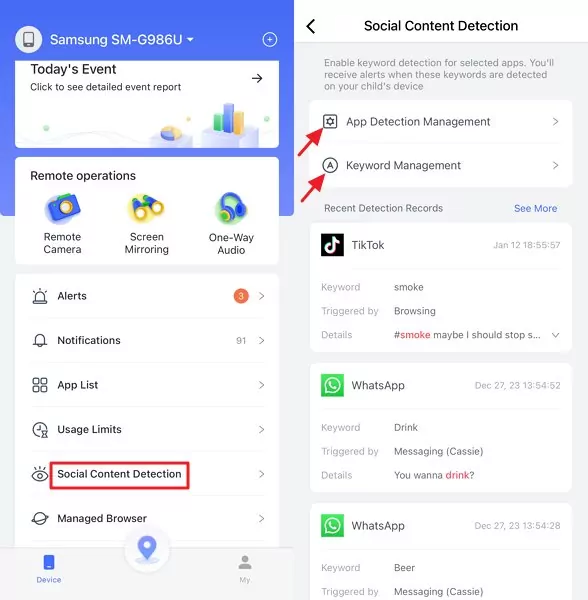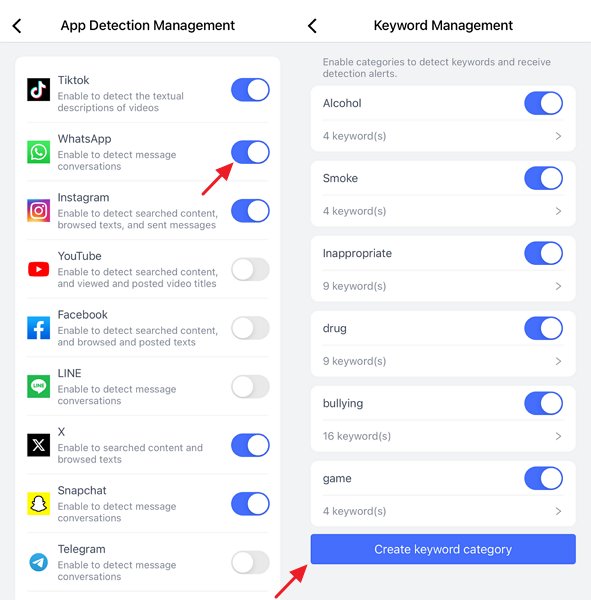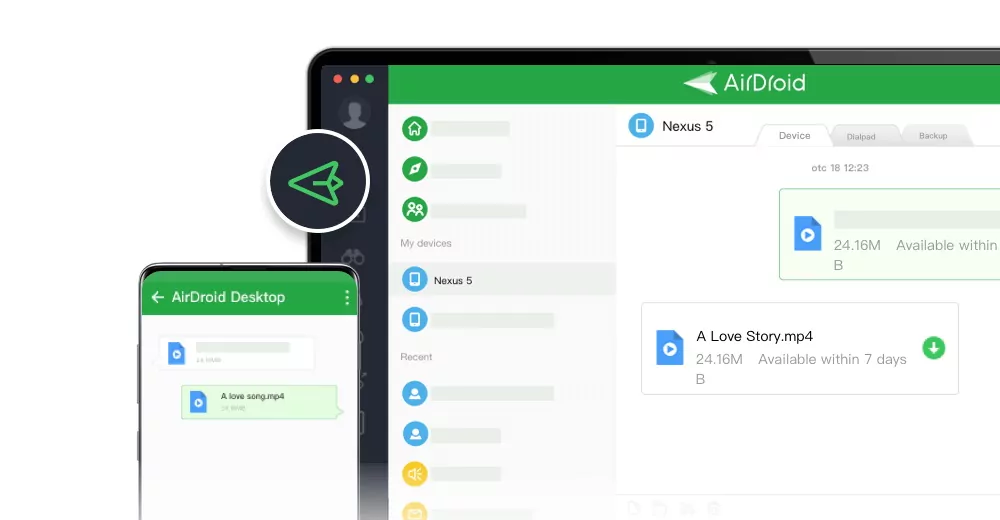WhatsApp Sexting: What Parents Need to Know
WhatsApp is a messaging platform that connects people with instant chatting capabilities across the globe. Sexting is a growing concern among parents that involves sexually suggestive or explicit messages, photos, or videos. Recently, WhatsApp has gained fame for being used for sexting by young adults, leading them to have inappropriate conversations and exchange explicit images.

While sexting can be a normal part of adolescent exploration, it can also have serious emotional and legal consequences. Parents should be aware of the potential risks associated with sexting on WhatsApp, such as unwanted sharing of explicit content, cyberbullying, and potential exploitation. We've covered everything parents need to know about WhatsApp Sexting and how to deal if you suspect your child is involved.
What Is Sexting?
Individuals engage in sexting by sending sexually arousing texts, GIFs, pictures, or videos online, typically through instant messaging apps. If you're wondering whether it's okay to send such messages, read on. Usually, adults and dating couples use sexting in a consensual and intimate manner.

However, it can also have serious legal and personal consequences, particularly if minors are involved. In most states, sending or receiving explicit images of someone under the age of consent is considered child pornography and is subject to strict legal consequences.
Why Sexting Is So Popular on WhatsApp?
WhatsApp is becoming a popular choice for private messaging and even sexts due to its secure and unique privacy settings. WhatsApp users, including young adults, feel safe in the knowledge that their conversations and media are encrypted and safe. On top of that, WhatsApp introduced the View Once feature, allowing users to send photos and videos that disappear once the recipient has opened them.
This feature was designed to give users more control over their privacy, particularly when sharing sensitive or confidential information. Following its privacy-focused design, the View Once feature has become a top priority for sexting, the exchange of sexually suggestive or explicit messages, photos, or videos. This is likely due to the perceived anonymity and security of the feature, as disappearing messages are less likely to be screenshotted or saved.
- It's convenient and easy to use
- Lets you kill boredom
- Offers compelling privacy features such as lock chat, view once, and application lock.
The Dangers of WhatsApp Sexting to Kids
Although WhatsApp is secure, still sexting on WhatsApp poses a significant risk to all users, especially kids, that parents should be aware of. One of the most concerning aspects is the psychological impact it can have on young minds. When teenagers engage in sexting, they might not fully comprehend the emotional toll it can take on their mental well-being.
The potential consequences of sexting include feelings of guilt, shame, regret, and anxiety, as they may fear that their intimate messages or images will be shared or exposed. Fear of negative exposure can lead to emotional distress and anxiety, affecting their self-esteem and overall mental health.
Relationship Problems: Sexts can cause significant damage to both romantic and platonic relationships between teenagers. Once the explicit message is shared with others without consent, it can lead to feelings of betrayal, hurt, and anger. As a result, their relationships can be undermined, making it difficult to rebuild trust that has already been destroyed. Moreover, teenagers may become hesitant to communicate and open up to others as a result of this feeling of vulnerability.
Permanent Digital Footprints: Sharing private content can have unforeseen consequences. Once sent, you lose control over it, and it can be easily shared or posted online, potentially causing regret and embarrassment. Another major danger of sexting is the ease with which digital content can be shared and replicated. Once a sext is sent, the recipient has control over it, and they can instantly capture a screenshot, forward it, or even post it online. This means that even if you send a sext to someone you trust, there's no guarantee that it will remain private.
The consequences of leaked sexts can be severe and far-reaching. Sexts can spread rapidly through social media, reaching a vast audience within seconds. This leads to humiliation, embarrassment, and damage to one's reputation. In some cases, leaked sexts can even result in legal consequences, particularly when minors are involved.
Signs Your Child Might Be Involved in WhatsApp Sexting
It is important to recognize the signs that your child might be involved in WhatsApp sexting to ensure their safety and well-being. While some of these signs may not necessarily indicate sexting alone, they can collectively raise concerns about your child's online activities.
1. Changes in Behavior or Emotional State
If your child's emotional state changes suddenly, such as increased irritability, withdrawal, or depression, you should be cautious. Sexting-related stress or concerns about their messages being exposed can lead to emotional turmoil. Moreover, If your child becomes evasive or reluctant to engage in discussions about their online activities, this might suggest they are hiding something that you need to check.
2. Increased Secrecy Around Digital Devices
If your children use multiple private or hidden messenger apps, they might be trying to hide their conversations from you. Your child may lock their devices and use app lock for the WhatsApp application, so you can't access their content. It's important to speak to your child about the importance of keeping conversations safe and open between the two of you. Ask them to give you access to their devices and apps so you can monitor their conversations. Explain to them why it's important to keep these conversations open.
3. Unusual Data Usage
Keep an eye on your child's data usage. If the data consumption suddenly spikes without a clear explanation, this could indicate a high volume of data-intensive activities, including sharing images or videos through WhatsApp.
How to Help Your Child Avoid WhatsApp Sexting?
Internet usage by children comes with several risks and dangers, which parents should be aware of. One prevalent concern is the issue of sexting, particularly on messaging platforms like WhatsApp. Parents must take active measures to assist their children in avoiding such inappropriate behaviour.
1Have an Open Communication
Please don't wait until sexting becomes an issue to talk to your child about it. Discuss online safety and responsible usage of technology from a young age, and make it a regular topic of conversation. Clearly explain the age-appropriate boundaries you expect your child to follow while using WhatsApp. Make sure they understand that sexting is not appropriate and will not be tolerated.
2Educate About Risks
Teach your child about the potential risks of WhatsApp sexts. For instance, the emotional and psychological consequences, the permanent nature of digital information, and, most importantly, the legal penalties. Make sure they understand that their online actions can have real-world ramifications.
3Monitor Their WhatsApp Online Activity with AirDroid Parental Control
It is often impossible to always know what your kids are up to on WhatsApp, but AirDroid Parental Control makes it possible. It allows parents to track their kids' conversations. It also provides parents with a detailed overview of their children's activities on WhatsApp as well as social media apps.

In addition, It recently introduced “Social Content Detection,” which instantly alerts parents when any inappropriate content is sent by your kids. The feature provides parents with an in-app alert system to receive notifications about suspicious activity and allows users to report explicit or arousing content. It has a zero-tolerance policy for age-appropriate content that isn't suitable for kids.
Here’s how to use AirDroid Parental Control:
Step 1. Download the AirDroid Parental Control app from the Google Play Store or App Store, you can also visit the web version at webparent.airdroid.com directly. Create an account and log in.
Step 2. To monitor your child's WhatsApp activities, you should download AirDroid Kids on their phone. After installation, launch AirDroid Kids and enter the pairing code to bind the device. You will then need to configure some necessary settings.
Step 3. Now launch the AirDroid Parental Control app, select the option 'Social Content Detection'.

Step 4. Next, tap on 'App Detection Management' to activate content filtering for WhatsApp, then choose 'Keyword Management' to input the specific keywords you wish to filter on your child's phone.

4Teach Them How to Report Inappropriate Behavior
Encourage children to report suspicious contacts immediately, emphasizing that early intervention can prevent further harm. Let them know that their voices matter and that you will believe them. Show concrete examples of inappropriate behavior, using everyday examples to demonstrate the concept. Build their confidence by engaging them in role-playing exercises that practice reporting scenarios.
Final Remarks
In light of the dangers of sexting on all social media platforms, users need to take proactive measures to protect their children. Following the negative psychological effects, the potential for sharing of sensitive content, and the lack of a screenshot-blocking feature, parents must step in and assist their children.
They need to set clear boundaries and explain to their child that sexting is not only inappropriate but also unhealthy. Kids shouldn't share any photos, videos, or other personal information with anyone, regardless of their age. It is essential that parents foster open communication with their children, educate them about the associated risks, and monitor their online activity responsibly with tools such as AirDroid Parental Control.










Leave a Reply.